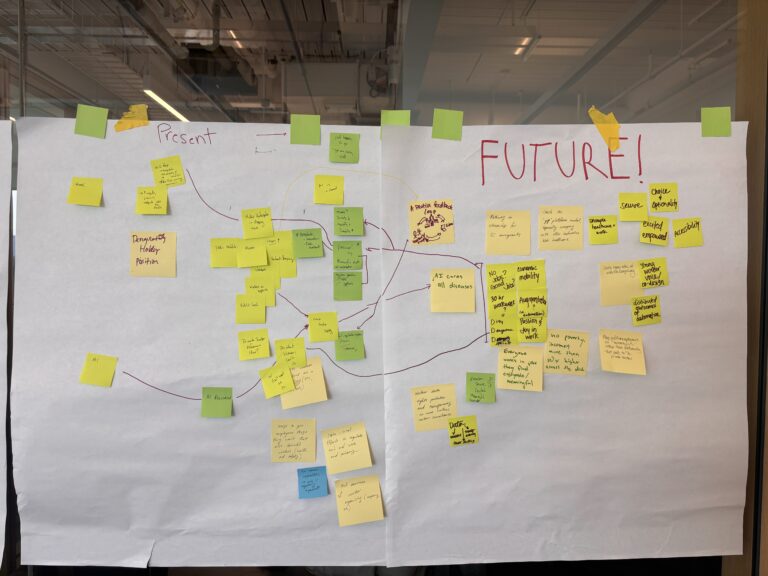Siegel Family Endowment is proud to introduce our first cohort of incredible researchers and academics who make up the foundation’s new partner research fellowship program. Selected by leading institutions that have received support from our grantmaking, these individuals will explore instrumental research questions underpinning Siegel Family Endowment’s grantmaking while bolstering our growing in-house research capabilities.
The fellows will participate in research projects with support from the foundation through research seminars, hosting events, and sharing content that sheds light on their work and interest areas with the larger Siegel Family Endowment community. John Irons, Senior Vice President and Head of Research, will oversee the program.
This group of eight fellows includes:
Kevin Aslett, New York University’s Center for Social Media and Politics (CSMaP)
Kevin Aslett is a Postdoctoral Associate in the Center for Social Media and Politics at New York University. He is also a Fellow at the Political Economy Forum at the University of Washington. His research broadly focuses on the effect of technological change and supranational institutions on threats to liberal democracy (specifically fake news/misinformation, populism, and patronage). In addition, Aslett has developed new methods in the field of political communication that remove obstacles to extracting information from enormous collections of electronic text and images that users encounter online. He has published applications of machine learning that unlock big and complex data, so that he and others can effectively research the effect of social media on political preferences and opinions. Aslett has published articles in peer-reviewed journals such as Policy Studies Journal and Europe-Asia Studies and in popular outlets such as the Washington Post. He also serves on the Editorial Board of the Journal of Online Trust and Safety run by the Stanford Internet Observatory. He received his PhD in Political Science from the University of Washington.
Michael Bernstein, Stanford University’s Center for Advanced Study in the Behavioral Sciences (CASBS)
Michael Bernstein will spend the fellowship year at CASBS developing theory and design for pro-social social media platforms. Bernstein’s research designs, builds, and studies social computing systems at scales from teams to crowds. He is an associate professor of computer science and STMicroelectronics faculty scholar at Stanford University, where he is a member of the Human-Computer Interaction Group. This research has won best paper awards at top conferences in human-computer interaction, including CHI, CSCW, and UIST, and reported in venues such as The New York Times, New Scientist, Wired, and The Guardian. Bernstein has been recognized with an NSF CAREER Award, Alfred P. Sloan Fellowship, and UIST Lasting Impact Award. He holds a bachelor’s degree in Symbolic Systems from Stanford University, as well as a master’s degree and a PhD in computer science from MIT.
Samantha Bradshaw, The Stanford Center on Philanthropy and Civil Society
Samantha Bradshaw is a Postdoctoral Fellow at the Program on Democracy and the Internet and the Digital Civil Society Lab. She completed her D.Phil. at the Oxford Internet Institute, where her research examined the producers and drivers of disinformation and computational propaganda. Samantha is broadly interested in the relationship between technology and democracy, and the politics embedded into the technical design and private practices of platform companies. Her fellowship work will examine the gender dimensions of disinformation, and how harassment and misogyny are used to suppress the political participation of women online. Samantha has published in leading academic journals, her research and public writing has also been featured by numerous media outlets, and she has spoken on expert panels and delivered keynote lectures around the world. She has also been involved in public policy discussions in the United Kingdom, Canada, and the United States about the effects of technology on democracy.
Sophie Kelmenson, University of North Carolina’s Department of City and Regional Planning
Sophie is interested in the intersection of food systems and natural resource planning and economic development, particularly in rural contexts. Some recent projects include 1) analyzing how scientific and community expertise shape marine resource planning for aquaculture development projects, and 2) analyzing efforts of “local food” projects to scale up while maintaining or expanding the ethos of “local.” She has also done research on coastal adaptation, hog waste to energy projects, and climate change and the future of work. Sophie earned her master’s degree in city and regional planning from the University of North Carolina at Chapel Hill. She has a bachelor’s degree in government and legal studies from Bowdoin College.
Alexander Kowalski, Massachusetts Institute of Technology’s Institute for Work & Employment Research
Alex Kowalski is a Ph.D. candidate in the Institute for Work & Employment Research at the Massachusetts Institute of Technology’s Sloan School of Management. Drawing on interdisciplinary training in sociology, industrial relations, and economics, his research investigates how the future of work is unfolding in the e-commerce fulfillment industry. In this setting, he focuses specifically on the causes and consequences of problematic work scheduling and on how nascent robotic technologies are reshaping the organization of work. He received a master’s degree in city planning from the University of California, Berkeley, where he focused on community and economic development. Before that, he was an economics reporter for Bloomberg News in Washington, D.C.
Rachel Kuo, University of North Carolina’s Center for Information, Technology, and Public Life (CITAP)
Dr. Rachel Kuo writes, teaches, and researches race, social movements, and digital technology. She is currently a Postdoctoral Research Fellow at the Center for Information, Technology, and Public Life at the University of North Carolina-Chapel Hill and Visiting Scholar at Duke University’s Asian American and Diasporic Studies program. She is also a Fellow at the Center for Democracy and Technology. Bringing together archival research and ethnographic fieldwork, her current book manuscript, Movement Media: Racial Solidarities Across Platforms, demonstrates how technologies enhance and foreclose possibilities for political organization across uneven racial and class difference. She has a PhD and MA in Media, Culture, and Communication from New York University, and her bachelor’s degree in Journalism from the University of Missouri.
Brandeis Marshall, Spelman College
Brandeis teaches, speaks and writes about the impact of data practices on technology and society. Her work contributes to the data engineering, data science, and data/computer science education fields. Through Dr. Marshall’s data education firm, she guides current tech workers in building data equity skills. Her first book, Data Conscience: Algorithmic Siege on our Humanity, is expected to be released in mid-2022. It unearths the interlocking computational and civic implications of data (mis-)use on digital processes, structures and institutions. Dr. Marshall holds a Ph.D. and Master of Science in Computer Science from Rensselaer Polytechnic Institute and a Bachelor of Science in Computer Science from the University of Rochester. She is on sabbatical leave from Spelman College, where she is a Full Professor of Computer Science.
Emily Tavoulareas, Georgetown University’s Beeck Center
Emily uses design and technology to make things—products, experiences, programs, policies, organizations—work better for people. In her career she has been a product manager, service designer, user researcher, program designer, and advisor to senior executives transforming the products, services, and/or organizations they run. In every role she translates deep understanding of human and organizational needs into viable solutions. From 2013-2018 she worked with the Department of Veterans Affairs and the White House to modernize the way the federal government delivers services to the public. From co-founding the first agency-level team of the U.S. Digital Service and modernizing the Veterans application for healthcare, to piloting and scaling the Human-Centered Design methodology with an intrepid team at the VA Center for Innovation and serving as Senior Policy Advisor the U.S. Chief Technology Officer at the White House, she has experienced first hand what it takes to modernize and transform large and complex organizations. She is currently building her own venture, teaching at Columbia University, and working as an independent advisor, helping leaders across industries effectively navigate the complex process of improving their product / service / organization. She received her Masters degree in International Affairs from American University, and her Bachelor’s degree from the College of William and Mary.





